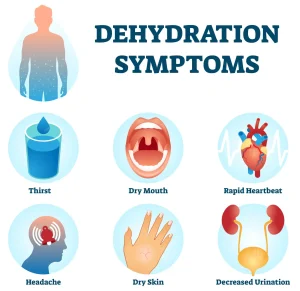Overview
Dehydration occurs when the body loses more fluids than it takes in, resulting in an inadequate amount of water to carry out normal bodily functions. Water is essential for regulating body temperature, maintaining blood pressure, and supporting organ function. Dehydration can range from mild to severe and may affect people of all ages, especially infants, older adults, and those exposed to hot environments or illness.
Symptoms
Symptoms of dehydration vary depending on its severity:
-
Increased thirst
-
Dry mouth and lips
-
Reduced urine output or dark-colored urine
-
Fatigue or weakness
-
Dizziness or lightheadedness
-
Headache
-
Dry skin with reduced elasticity
-
Confusion or irritability in severe cases
Causes
Dehydration develops when fluid loss is not adequately replaced:
-
Inadequate fluid intake
-
Excessive sweating due to heat or exercise
-
Diarrhea or vomiting
-
Fever
-
Increased urination from diabetes or diuretic medications
-
Burns or significant fluid loss from the skin
Risk Factors
Certain groups are more vulnerable to dehydration:
-
Infants and young children
-
Older adults
-
People with chronic illnesses such as diabetes or kidney disease
-
Athletes or individuals working in hot environments
-
Use of medications that increase fluid loss
-
Illnesses causing vomiting or diarrhea
Complications
If dehydration is not corrected, it can lead to serious complications:
-
Heat-related illnesses
-
Electrolyte imbalances
-
Kidney stones or kidney failure
-
Low blood pressure and shock
-
Seizures in severe cases
-
Organ failure if prolonged
Prevention
Preventing dehydration involves maintaining adequate fluid balance:
-
Drinking sufficient water throughout the day
-
Increasing fluid intake during hot weather or physical activity
-
Replacing fluids lost during illness
-
Monitoring urine color as a hydration indicator
-
Avoiding excessive alcohol or caffeine intake
-
Encouraging regular fluid intake in children and older adults
Advertisement

